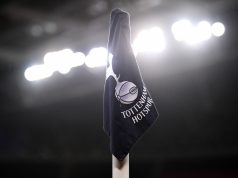“Nobody cares” used to be the stock reply from many men to tweets about women’s football.
Why you tweeting this? Nobody is even bothered. Just stick to the proper football. Can’t you have a separate account for this? This isn’t why I follow you.
We all sailed past a lot of that last summer, as England won the Euros. This summer, if we can call it that, has pushed things further forward.
There were excuses made before the World Cup from some who follow the women’s game regularly. Worry that early kick-offs would struggle to capture the imagination of an English audience and similar across Europe.
Nervousness that if the tournament in Australia and New Zealand wasn’t a success, the achievement of last year would be left far behind and the step forward that had been taken would be reversed.
Concerns which have been cast aside.
The quality and drama in the knock-out stages has been a show, and the women involved are becoming bigger stars than was beyond my imagination as a little girl growing up in the 80s.
But the “nobody cares” group is somewhat evolving. In reality, for many it was never that they didn’t care, they very much did, they just didn’t want to see women’s football covered… or to be confronted with the potential success of it.
Not caring has turned into something of an art form.
Let us take Ross Clarke of The Telegraph. He works for a newspaper which actually has good coverage of womens’ sport, although it’s doubtful he’s read any of it.
You see, Ross hasn’t watched any of the World Cup.
Let him explain it himself: ‘What a fantastic achievement for the Lionesses to have reached the final of the women’s football World Cup. I wish I could join in the celebratory atmosphere a little more, but to be honest I haven’t watched a single minute of the tournament. In fact I couldn’t even tell you how the England team reached the final, other than that they defeated Australia in the semi-finals. It is not that I have been trying to avoid women’s football, but I just haven’t managed to summon up the enthusiasm.’
Let’s hear some more from him: ‘From my point of view you might as well give us a day off to celebrate Grimsby Town’s two-nil victory over Salford City on Tuesday.’
Oh Ross. At least you got your real views off your chest, darling, without having to go through the ordeal of actually watching a single minute of the tournament you wrote an article about.
Women’s football exists for many purely in a vacuum of comparison
For some men, such as the aforementioned gent, comparison has to be used to dilute any success or impact.
Win the Euros did you? Ay, enjoy your little selves but it’s not the proper one is it, something-something Fleetwood Town.
Score a good goal did she? You could see it that way, but the goals are too big, need to be little for the women.
Lots of people watched the match? Yeah but look how many watched Only Fools and Horses on that Friday night in 1984.
The comparison overreach can also come from a position of positivity.
Sarina Wiegman has been a phenomenal success since taking the England job, and yet there’s a thirst to validate that by suggesting she could take on the same position in the men’s game.
Following the semi-final victory over Australia, FA chief executive Mark Bullingham was pressed on whether Wiegman could take over from Gareth Southgate.
He rightly said such a question was verging on disrespect to England Women, but his comments suggesting it wasn’t impossible became almost as big a story as the team getting to the final.
Success in women’s football needing to be somehow validated, or otherwise, by links to the men’s game, is a theme.
This eagerness, for some seemingly a necessity, to frame women’s success through the prism of the male game is a repeated phenomenon.
Emma Hayes’ success at Chelsea was quickly met with pondering about whether she should get a job in the men’s game. There’s a clear belief from some that true success with the women opens up a route to the “proper” version of football.
And yet, women’s football is growing so quickly that the excitement lies within.
Commercial opportunities beyond compare will be available to those clubs and countries who invest, and top players will become even bigger stars than they already are.
There may never be the crowds associated with men’s football in the UK. The last time there was, in the 1920s, the women’s game was largely banned for 50 years. Clubs who were members of the FA were instructed to ban women’s football from their facilities, and it’s been a very long road back.
Nobody knows what may have been if that hadn’t happened, and there’s little use twisting the mind to scenarios relating to such.
In the here and now, women’s football is doing well.
On its own merits.
Enjoy the final,
Annie.



























